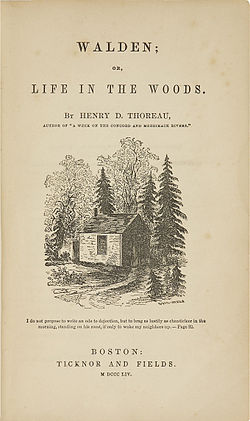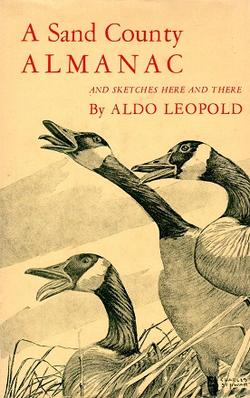He said that much of contemporary story writing, both novels and memoirs, was concerned with trauma. He said that this was a rather recent development in literature---the extreme and almost universal focus on the personal tragedies that one has suffered.
Amen, I thought. I just can't stand the whole here's how I was a victim thing much anymore. I know a lot of people enjoy that, but it doesn't speak to me. As Don pointed out, personal downfall can always be an element of any story, but we have come to believe that it is the only thing worth writing about.
"Folks seem to think that unless something terrible has happened to them, then they have nothing to say in a story," he said.
He mentioned the works of Henry David Thoreau and Aldo Leopold as counter-examples from the era in which trauma was not assumed to form the core of all good narrative.
"Where's the trauma in Walden?" he asked. "There is none. It's a story about a guy who goes out and lives in the woods by a lake."
"And where's the trauma in A Sand County Almanac? Maybe you could say it is when he's looking into the eyes of the dying she-wolf, but that's really stretching it."
When he was done, I raised my hand to comment.
"In a way, there is a trauma in both Walden and A Sand County Almanac," I said. "But it's not a personal trauma. It's a societal-wide trauma that hangs in the background. Thoreau was reacting against the trauma of the Mexican War. Leopold was reacting against what he perceived as the trauma of the destruction of the natural environment."
He agreed with my point and elaborated upon it,in a rather poetic way, coining the phrase "ambient trauma" to describe the background tension in both of those stories. I liked that phrase: the ambient trauma.
After lunch I had to squeeze into the lodge to find a seat for the afternoon panel discussion. It was Snow himself who was to moderate it. The speakers, who sat beside each other on chairs on the small stage in the back of the room, were William Kitteridge, Judy Blunt (a noted essayist about her life as a Montana rancher), and a man who was community activist whose work it was to bring together local ranchers and farmers with the environmental community.
The theme was the Changing Landscape of the American West. Don Snow introduced the discussion by describing how decades-ago many of the western states had adopted a policy of trying to transition from a hard resource-based economy to the "amenity economy" of tourism and other "low impact" activites favored by environmentalists. But this policy, although successful in many cases, had unforseen consequences, both in terms of land usage and human communities. For example, many of the best stewards of the land were actually the ranchers themselves, and they were ironically being pushed out by the success of tourism.
"Just look at the main street of Joseph," he said. "Look at the businesses that have been moving in there. They're part of the amenity economy."
The panel discussion was lively and interesting. At dinner time, I found myself back out on the patio, once again joined by many of the same folk as the night before. To my right was a woman from Western Massachusetts whom Kim introduced as the editor of Orion, a literary magazine in which many people at the conference had published essays and stories, and which they held in high esteem. Scott Russell Sanders, whom I'd met the night before, sat across from me.
It was very interesting to listen to him. He was wrestling with understanding the role of beauty in evolution. He wanted to understand how natural selection acting through evolution could produce the seemingly useless but beautiful features found in nature, not only the rich variations of the blossoms of the many flower species around the world, but also in the human achievement of, say, higher mathematics.
"It reminds me of how Einstein sometimes did physics," I said. "He called it his aesthetic criterion, the idea that fundamental equations of nature should be beautiful in their mathematical form. That's supposedly how he came up with the tensor equations of General Relativity that govern how spacetime responds to localized presences of matter and energy. He asked himself what would a beautiful equation looked like, that related these physical quantities?"
 |
| It would look like this! |
Scott was acquainted with Einstein's aesthetic criterion. I could tell he'd thought about it a lot.
"There was that expedition to Africa during an eclipse, around the time of World War I, to verify Einstein's prediction that light would curve around the sun," he said.
"The Eddington expedition," I chimed in.
Scott continued:
 |
| A.S. Eddington, The Observatory, 42 (1919) |
"Someone asked Einstein what his reaction would be, if the prediction had not been true. He said that he would have been disappointed that God had designed a universe less interesting than it could be." (ed. note: this is my paraphrase of Scott---I am not familiar with the Einstein quote cited here).
After dinner there was a lively set of readings by various authors, as well as music. The lodge was so packed that people had to sit outside on the lawn in chairs listening on the loud speakers. I stayed outside the whole time, pacing about, as is my usual habit. I often stopped in front of the open door to peek at the various speakers, curious to see what each one looked like, standing at the podium in the warm-light glow of the little stage.
The highlight of the evening was certainly the Fishtrap-themed Guy Noir parody, performed with great humor by several of the writers and staff members, who spoke with uncanny imitation of the style of A Prairie Home Companion, augmented on stage by funny, appropriate sound effects. For a few moments it felt like Summer Stock in some earlier era of Americana.
I went right up to the window to watch this one. I wanted to see them performing it. It was received with warm applause by all.


No comments:
Post a Comment